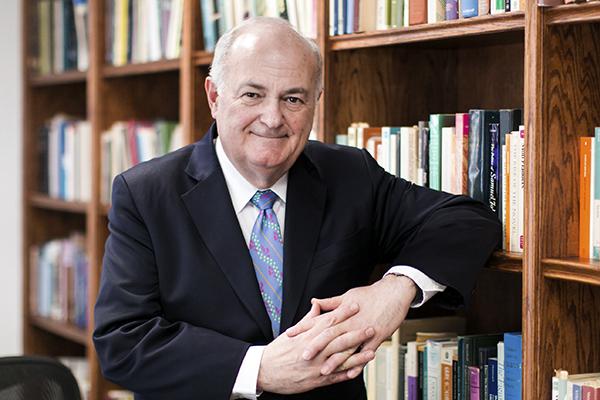Officials are transferring the responsibilities of the Innovation Task Force to another cost-cutting group after the ITF was inactive for two years.
University President Steven Knapp said earlier this month that the challenge of identifying cost savings will now land on a team of vice presidents instead of the ITF – a group he created in 2009. Faculty said the end of the ITF, which has not met since December 2014, is unsurprising, but it will be necessary to continue to find savings as GW faces another round of budget cuts in its central administration.
The ITF was charged with finding a total of $60 million per year in recurring savings. Knapp said $32 million in savings have been identified in the budget for this fiscal year.
“Those initiatives that were part of ITF will keep playing out over the next several years,” Knapp said. “It’s going to take a while for them to wrap all the way up to the $60 million a year.”
Knapp first announced the council of administrators, tasked with streamlining administrative functions, last year. He said the two groups will essentially combine and the ITF will not present any new ideas. In the past, the ITF released new rounds of cost-saving ideas every six months.
“We’re not just turning it off because some of those initiatives are still in the works, but we’re not using that process now as the way of generating new ideas,” Knapp said. “We’re getting everybody to generate new ideas.”
Knapp said the vice presidents, who he meets with weekly, will examine each of their own divisions for areas where they can cut costs as part of previously announced budget cuts to the central administration. In December, Knapp announced 3 to 5 percent budget cuts for all central administrative divisions each year for the next five years.
Knapp said some of the initiatives the task force has implemented, like reusing furniture, creating an in-house temporary agency and cutting down on travel expenses, will continue to play out even though officials will not be brainstorming new ideas in the same format.
Knapp said the new model will allow officials to identify more savings in administrative functions. He said efforts like reducing the number of people needed to sign off on decisions or automating systems that are currently done on paper will also save money.
“If you reduce the number of steps that you have to take to do something, you can save money,” Knapp said. “I would still want people not to be driven crazy by having to sign 14 different forms to get some little thing done.”
In December 2014, former Provost Steven Lerman said the ITF would focus on implementing the ideas it had already introduced instead of creating new ones. Earlier this month, the former co-leader of the ITF said he was talking with officials about ways to reshape the program.
Meghan Chapple, the co-chair of the task force, deferred to Knapp’s comments and declined to provide further details. Chapple has led the ITF since 2014, along with Paul Schiff Berman, the former vice provost for online learning and academic innovation.
By December 2014, the ITF had identified about $64.7 million in potential recurring savings for the University, but did not implement many of the ideas after determining the projects would have been too expensive to create. In fiscal year 2015, the ITF returned $27 million to the budget.
Charles Garris, the chair of the Faculty Senate’s executive committee and a professor of mechanical and aerospace engineering, said merging committees is a smart move because a more streamlined administrative structure means faculty can feel closer to senior leaders.
Still, Garris said officials should be more transparent about the change.
“I think what Knapp is doing is probably the right thing,” Garris said. “The only thing is, I don’t know exactly what is going on.”
Theodore Barnhill, a professor of finance, said he is not surprised that the University is making an effort to reduce administrative bureaucracy. He said the focus on streamlining the central office will help the University cut down on unnecessary costs.
“The cost of central administration is one that deserves close attention,” Barnhill said. “The University clearly is in a period of financial stress.”
Barnhill said it would be more beneficial to the University for administrators to devote energy to helping schools develop their programs rather than making cuts in central offices. He said that focusing on the development of the individual schools will allow them to reinvest in faculty and programs and attract high-quality students from around the world.
“You can’t cut your way to excellence, you’ve got to innovate your way to excellence,” Barnhill said. “You’re never going to generate greatness from a central administration.”
Jennifer Delaney, an associate professor of education policy, organization and leadership at the University of Illinois at Urbana-Champaign, said the direction the University is moving to reduce central administrative power is in contrast to a trend of universities growing their administrative functions.
Delaney added that ideas like the ones generated by the ITF can often be misleading in how much money they will save.
“It’s hard to point out institutions that have had great success with this,” Delaney said. “Often things that look like cost savings don’t necessarily pan out.”
Colleen Murphy and Jacqueline Thomsen contributed reporting.






